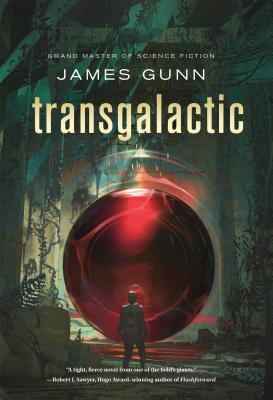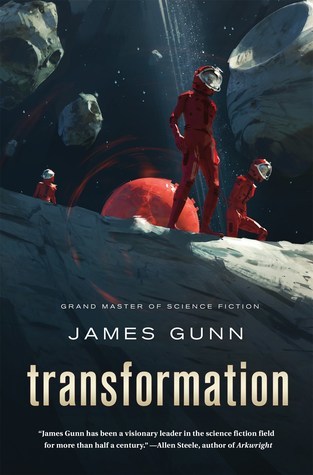“Jim Gunn doesn’t publish a new novel very often, but when he does it’s a whopper. Transcendental is his best yet, and in it he demonstrates his possession of one of the most finely developed skills at world-building (and at aliens-creating to populate those worlds) in science fiction today. Read it!” —Frederik Pohl, bestselling author of Gateway
Description:
Planets at the edge of the Federation have been falling mysteriously silent. The arrogant and recalcitrant bureaucracy running the Federation grudgingly allows two transcended humans, Riley and Asha, to investigate. They join forces with the Earth's Pedia, a global A.I., along with Tordor, a Dorian representative of the Federation, and Adithya, a member of a splinter group vowing to destroy the Pedia. No one on the team trusts one another.
They must find a common ground and the answer to the planetary silences in order to confront an enemy more ancient than the Transcendentals and more powerful than any Pedia.
Praise:
“James Gunn, after a long, stellar career in science fiction, is a master of the narrative art—as he shows in this Chaucerian pilgrimage through the galactic future.” —Robert Silverberg, bestselling author of Lord Valentine’s Castle
“Reads more like a collaboration between Heinlein and Asimov. The concept is pure, classic science fiction.” —New York Times Book Review on Star Bridge
“Its characters, at least the protagonists, are drawn with psychological depth. The charm and vividness of Gunn’s prose, plus his deft hand at keeping his plot moving, will keep readers on board through the end. The recent saga of Occupy Wall Street and the other Occupy movements around the country makes many of the events and actors of Kampus feel very current.” —Fantastical Andrew Fox
“One of the very best portrayals of contact with extraterrestrial intelligence ever written.” —Carl Sagan on The Listeners
EXCERPT
CHAPTER ONE
The invasion began a million or more long-cycles ago, but the galaxy is bigger than minds can encompass, and information crawls across interstellar space if it moves at all. The Galactic Federation was slow to recognize the nature of the danger.
The Galactic Federation is a misnomer. It actually occupies only a single spiral arm of the local galaxy that humans call “the Milky Way,” although in recent long-cycles explorations began into the neighboring spiral arm in search of what had become known as the Transcendental Machine. So it is not surprising that the invasion went unnoticed until remote worlds of the Federation began to fall silent, sending out no capsule messages through the network of nexus points that made interstellar travel and communication possible, and failing to acknowledge those sent as routine reports or inquiries.
Finally, bureaucracy stirred and dispatched automated survey ships and, when they did not return, ships staffed with representatives of the various species that made up the Federation. They, too, went missing until, at last, a single damaged vessel appeared in a space monitored by Federation Central and remained motionless where it had materialized from a nexus point. When it was finally reached and boarded, investigators found its crew dead except for a single survivor, the captain.
He was a Dorian and his guttural voice was recorded before he died. “They are all dead, all dead,” he said. It wasn’t clear to his rescuers whether he was referring to his crew or the inhabitants of the planets they surveyed. “We brought them into the ship, thinking they were evidence of what had happened, maybe recordings, our science officer said. But they must have been poisoned. They were sterilized, you know, according to protocol. We did everything by protocol. They swarmed out, unseen but we knew they were there by what happened. The crew went mad, you see. The invisible creatures did that, and the crew turned upon each other as if they were trying to get away. But they couldn’t until they all were dead. All dead.”
The investigators found no evidence in the ship’s automated records about invaders, only recordings of the crew killing each other with their bare hands and anything they could tear away from the ship to use as weapons. The ship had returned only because the captain had programmed instructions to be executed automatically in case of emergency.
Finally Federation Central began to take seriously the possibility that something mysterious and possibly invisible had emerged in the unexplored spiral arms of the galaxy, or had entered the galaxy from somewhere beyond the zone of thinning stars and the beginning of intergalactic space. Three long-cycles later the news reached Riley and Asha and the Pedia at the heart of the human world.
Asha sent a message to Riley: “Get in touch about silent stars. Pedia says invasion is 92.4 percent likely.”
Riley turned to a rejuvenated Jak in his subsurface lunar laboratory. Jak was a mad scientist, who had turned his own clones into agents in the quest for the Transcendental Machine. Riley had entrusted Jak with the matter-transmission process that had led to transcendence. It was an act of blind trust if not even hubris—Jak was a mad scientist but he was Riley’s mad scientist. Now, with a copy of the Transcendental Machine reproduced in Jak’s laboratory, Jak had been his own experimental subject, followed by his daughter Jer, and the process had restored Jak’s health if not his youth. He was still mad, only not as desperate.
The laboratory itself was much as it had been when Riley had told Jak and Jer about the Transcendental Machine and left with them the red sphere that he had discovered on the primitive planet where the Transcendental Machine had stranded him, where dinosaurs had survived or avoided the catastrophes that had destroyed their kind, or their evolutionary equivalents, on other worlds. The red sphere had survived the millennia as well, the only known artifact in this arm of the galaxy of the creatures who had created the Transcendental Machine. Perhaps it held their secrets as well.
But now the laboratory was filled with the machinery of transcendence.
“The Pedia thinks the galaxy has been invaded,” Riley said.
“The Pedia doesn’t think,” Jak said. “It calculates.”
“Still—”
“Its calculations are usually accurate, although limited by a lack of imagination.”
“So—you think there is an invasion?”
Jak shrugged. “That’s a matter of definition. The galaxy is big and vast spiral arms are unexplored, even unapproached, like the ‘terra incognita’ of deepest Africa in the nineteenth century. So who knows what may lurk in the vast unknown, like the culture that created the Transcendental Machine, until it bursts into our sphere of awareness.”
“Your point is that it doesn’t matter whether it is native to our galaxy or from another galaxy?”
Jak shrugged again. He was clearly bored with this line of discussion. He bored easily, when it was not his idea.
“But surely what does matter is whether we are being invaded.”
“We?” Jak said. “It’s the Federation’s problem.”
“But what if the Federation is overmatched?”
“We’ll all be long dead before it affects our little corner of the galaxy,” Jak said. “If it ever does. The galaxy is far bigger and its stars are far more distant from each other than any of us—even me—can imagine. Our system is remote and in an impoverished neighborhood. It might easily be overlooked.”
“And that’s reason enough not to be concerned?”
“The Pedia has to be concerned,” Jak said. “That’s its categorical imperative: the welfare of the human species. That’s what I mean by a lack of imagination. We have other choices. And wasting my limited moments of existence on a possible invasion in the remote future by unknown creatures is not one of them.”
“So you think it’s possible?”
“Oh, I think it’s likely. As I said, the Pedia’s calculations are pretty accurate, and it has greater calculating power than anything this side of Federation Central itself. I just choose not to get involved.”
Riley nodded and made arrangements to return to Earth. He would deal with Jak later.
Copyright © 2017 by James Gunn
Goodreads ** Amazon ** Barnes&Noble ** BookDepository
About the author:
JAMES GUNN is the Hugo Award–winning author of Transcendental, Transgalactic, and The Listeners, and the coauthor, with Jack Williamson, of the classic epic SF novel Star Bridge. He lives in Lawrence, Kansas, where he is professor emeritus of English at the University of Kansas. He is the founding director of the university's Center for the Study of Science Fiction. Gunn is also one of the last living Grandmaster Award winners from the golden age of science fiction. www.sfcenter.ku.edu
Author's Giveaway
a Rafflecopter giveaway






No comments:
Post a Comment